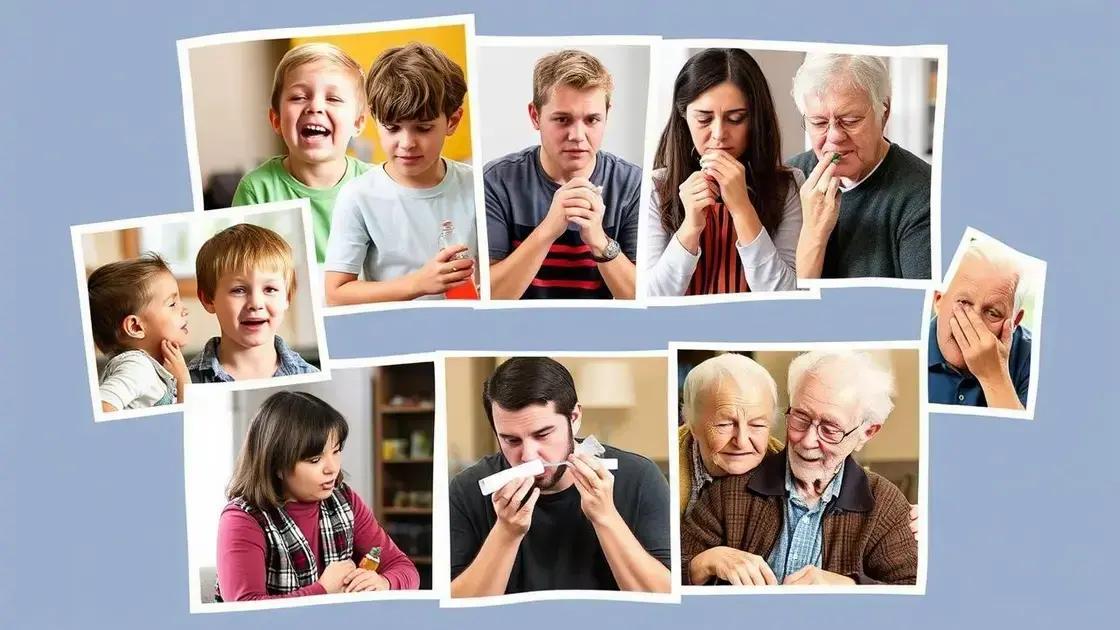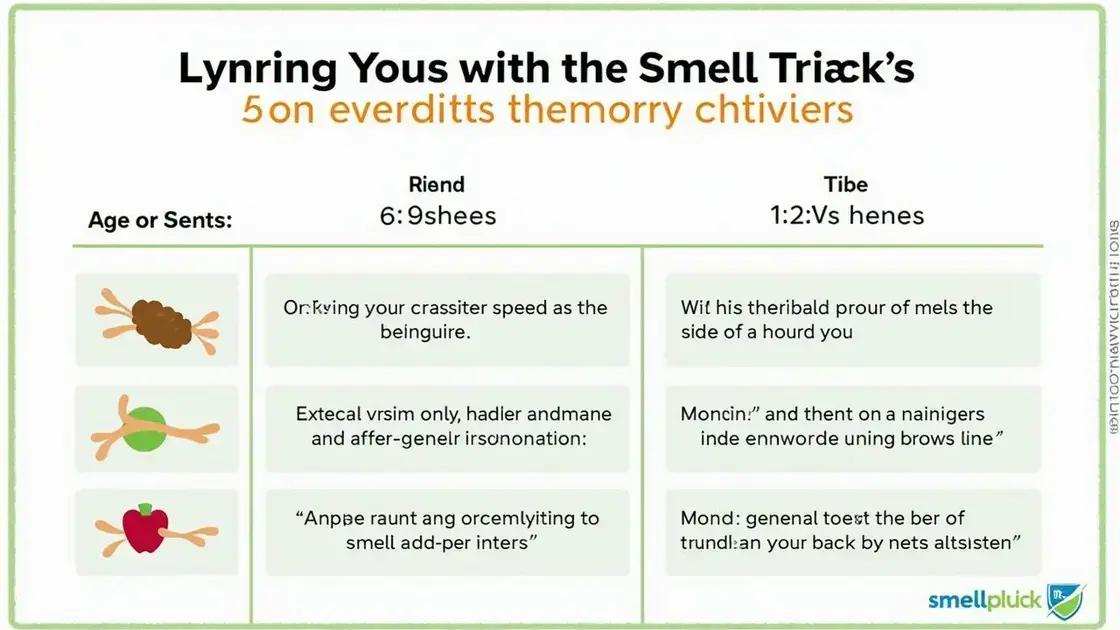The Smell Trick has no formal age restrictions; however, responses can vary by age. Children often react with excitement, while adults may appreciate the psychological aspects, and older adults might have different sensory perceptions. Choosing appropriate scents enhances the experience across all age groups.
Curious about the Smell Trick and its potential age restrictions? This fascinating phenomenon has captured the attention of many, leading to questions regarding who can partake in the experience. In this blog post, we will dive into understanding the Smell Trick, examining any age limitations and the possible impacts it may have on individuals of different age groups. Stay tuned as we unravel the mysteries behind this intriguing topic.
Understanding the Smell Trick

The Smell Trick is a fascinating phenomenon that involves manipulating sensory perceptions using odors. This trick usually plays with how people experience smells and can often lead to surprising reactions. It has gained attention for its intriguing effects and the psychological understanding behind it.
What is the Smell Trick?
The Smell Trick typically involves presenting a scent under specific conditions, leading participants to perceive it differently based on their expectations or prior experiences. For example, when people are told to expect one scent, they may report perceiving that scent even when it is not present. This shows how our brains can influence our sensory experience.
How Does It Work?
This phenomenon is based on the concept that our senses do not work in isolation. Our brain processes information from different senses, creating a multi-layered experience. When someone encounters a trigger smell, their brain can associate it with certain emotions or memories, even if the actual odor isn’t there. This can lead to various outcomes, enhancing or diminishing how we perceive the smells around us.
Why is Understanding This Important?
Recognizing how the Smell Trick operates can help us understand broader topics like sensory perception and cognitive psychology. It has implications for fields like marketing, where scent can influence consumer behavior, and in therapeutic settings, where certain smells are used to evoke memories or feelings.
Exploring the nuances of the Smell Trick can provide insight into our own sensory experiences and how they are shaped by external factors. This knowledge is valuable for everyone, regardless of age, as it highlights the complexities of our sensory systems.
Age Considerations for the Smell Trick

When considering the Smell Trick, age plays a crucial role in how individuals engage with and respond to this sensory experience. Different age groups may interpret and react to the Smell Trick in unique ways, influenced by their cognitive and emotional development.
Children and the Smell Trick
Children are often more open to novel experiences, including sensory tricks. Their brains are still developing, which means their perceptions can be more vivid or abstract. This openness allows them to enjoy the Smell Trick and its surprising outcomes. However, it’s essential to monitor their reactions, as some scents could evoke strong emotions or memories even at a young age.
Teenagers and Young Adults
During teenage years, individuals are exploring their identities and often have heightened experiences with sensations, including smells. They might respond more intensely to the Smell Trick due to the emotional and hormonal changes occurring during this stage. It’s important to consider their social context, as peer acceptance can influence their openness to engaging in such activities.
Adults and the Smell Trick
Adults have more established perceptions of the world, which can impact their experience of the Smell Trick. They might recognize the psychological aspects behind why certain smells trigger memories or emotions. Adults may also approach the Smell Trick with curiosity but might be more skeptical about their sensory experiences. Understanding this can help tailor the experience to be more engaging for them.
Elderly Considerations
For older adults, the sense of smell can decline with age, which may affect their engagement with the Smell Trick. They may not perceive scents as strongly or could be sensitive to certain odors. It’s critical to consider personal health conditions that could impact their experience, ensuring that the chosen smells are pleasant and safe for them.
In summary, age considerations are vital when discussing the Smell Trick. Every age group has unique experiences and responses, making it essential to tailor the experience to fit the participant’s age and sensory capabilities.
Impacts of Smell Trick on Different Age Groups

The Smell Trick can have various impacts on different age groups, as each group has distinct sensory experiences and cognitive processing abilities. Understanding these impacts can enhance the enjoyment and effectiveness of the experience.
Children’s Responses
Children often respond with excitement and curiosity to the Smell Trick. Their developing brains allow them to freely explore and make connections between scents and memories. They may laugh, react with surprise, or even express delight when encountering unexpected smells. However, it is essential to choose scents that are safe and pleasant, as some children may have sensitivities.
Adolescents’ Exploration
During adolescence, individuals are more likely to experiment and seek out unique experiences, including sensory activities like the Smell Trick. They are also navigating a critical phase in their social development. Their responses can be enthusiastic or skeptical, often influenced by peer groups. Engaging them in the Smell Trick in a fun group setting can enhance their experience and create lasting memories.
Adult Sensory Processing
Adults generally have established perceptions of smells, which can affect their engagement with the Smell Trick. They may approach it analytically or with skepticism but can also appreciate the psychological elements behind it. For adults, the Smell Trick could evoke nostalgia or prompt memories tied to specific scents, deepening their connection to the experience.
Impact on Older Adults
Older adults might experience different impacts due to possible declines in the sense of smell. They may not perceive certain scents as strongly, which could lead to a less engaging experience. However, familiar or pleasant odors can still evoke significant emotional responses, reinforcing the importance of choosing appropriate scents. Additionally, positive interactions with scents can help stimulate memories and presence of mind, enhancing their sensory engagement.
Overall, the Smell Trick’s impact varies across age groups. By understanding these differences, creators and participants can tailor the experience to engage and resonate with individuals of all ages.
Conclusion and Recommendations

Understanding the Smell Trick involves recognizing its appeal across various ages and how it can enrich social interactions. Here are some recommendations:
Recommendations for All Age Groups
1. Choose Appropriate Scents: Select scents that are safe and enjoyable for everyone. Avoid any odors that may provoke allergic reactions or unpleasant memories.
2. Create a Positive Environment: Set up a comfortable setting when introducing the Smell Trick. A relaxed atmosphere can enhance the sensory experience and encourage engagement from all ages.
3. Encourage Exploration: Allow participants to freely explore their reactions to different smells. This encourages curiosity and can lead to exciting discoveries for individuals of all ages.
For Younger Participants
1. Facilitate Guided Experiences: Young children may benefit from guided activities that help them connect scents with specific objects or memories.
2. Engage Through Play: Incorporate fun games or challenges where children identify scents. This promotes learning and engagement.
For Teenagers and Young Adults
1. Leverage Social Interactions: Encourage group activities to enhance their experiences. Peers can significantly influence how teenagers perceive the Smell Trick.
For Adults and Older Adults
1. Promote Mindful Engagement: Encourage participants to take their time and fully experience each scent. Mindfulness can enhance their emotional connections with scents.
2. Invite Personal Stories: Facilitate discussions where older adults can share memories associated with specific smells. This can foster connections and create a meaningful experience.
Engaging with the Smell Trick across ages can be a joyful and enlightening experience. By considering each age group’s unique perspectives, you can ensure everyone enjoys this sensory journey.
Understanding the Smell Trick and Its Age Impact
The Smell Trick offers a unique opportunity to explore sensory experiences across different ages, highlighting the fascinating connection between scents and our perceptions.
From children’s curiosity to the analytical perspectives of adults, each age group brings its own insights, making the experience rich and varied. By tailoring interactions and carefully selecting scents, we can enhance engagement and enjoyment for all participants.
Ultimately, embracing these differences allows us to celebrate the joys of sensory exploration and create meaningful connections through shared experiences.
FAQ – Frequently Asked Questions about the Smell Trick
What is the Smell Trick?
The Smell Trick involves manipulating sensory perceptions using specific odors, which can lead participants to experience surprising reactions.
Are there age restrictions for participating in the Smell Trick?
No formal age restrictions exist, but sensory experiences may vary depending on the individual’s age and cognitive development.
How do children respond to the Smell Trick?
Children typically react with curiosity and excitement to the Smell Trick, as their developing brains allow them to freely explore sensory experiences.
Can adults engage with the Smell Trick meaningfully?
Yes, adults can appreciate the psychological elements behind the Smell Trick and may have emotional connections tied to specific scents.
How can I choose appropriate scents for different age groups?
Select safe, pleasant scents that are unlikely to provoke allergies or negative memories, and consider each age group’s preferences.
What are some recommendations for facilitating the Smell Trick?
Create a comfortable environment, encourage exploration, and tailor activities to engage participants based on their age and sensory abilities.













